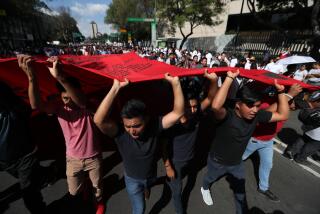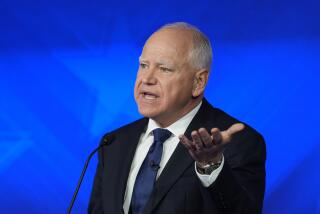Bush Issues Restrained Statement on China Crackdown Anniversary
WASHINGTON — Amid intensifying criticism of his China policy, President Bush on Monday issued a restrained statement marking the one-year anniversary of the violent government crackdown on student demonstrations in Beijing.
Noting that a year ago he had “deeply deplored” the decision to use deadly force against the protesters, Bush nevertheless expressed sympathy for the challenges facing China’s aging leadership as they try to modernize the huge and populous nation.
“Transforming China--with its 4,000-year-old civilization, its own distinct and extraordinary traditions, an undeveloped economy and an historically authoritarian political system--is a monumental task,” Bush said in a statement.
Bush, former U.S. envoy to Beijing, said that China made great strides in economic growth and freer political discourse in the 1980s but that he remains “deeply concerned” about human rights abuses and urged “a rapid return to the more positive course set before Tian An Men occurred.”
On the night of June 3-4 last year, Chinese troops opened fire on demonstrators in the streets around Beijing’s central Tian An Men Square, which had been the focus of weeks of pro-democracy protests. Estimates of the dead range from several hundred to several thousand.
Bush has come under fire in Congress and elsewhere for authorizing secret, high-level talks with Chinese leaders within weeks after the crackdown and, more recently, for advocating renewal of most-favored-nation trading status for China. Critics charged that by doing so, he was betraying American ideals and the memory of the students who died in what has come to be known as the Tian An Men massacre.
Before the White House issued its statement on China, Senate Majority Leader George J. Mitchell (D-Me.) blasted Bush for echoing the Chinese government’s official silence on the anniversary of the crackdown.
“Americans have not forgotten and will not forget the massacre at Tian An Men Square last year, despite the silence of their President,” Mitchell said. “The Chinese people must be told that the President’s silence does not represent the view of all Americans.”
Mitchell added: “The rulers of China are hoping the world will forget what happened 12 months ago. And President Bush, by renewing most-favored-nation trading status for China, is doing what the Chinese government wants done.”
Meantime, the State Department decried the beating of journalists covering student demonstrations in Beijing late Sunday and early Monday and summoned the Chinese ambassador to the State Department to hear an official protest.
A number of journalists trying to cover the anniversary protests--including the wife of The Times’ correspondent in Beijing--were harassed and beaten by policemen and some were briefly detained.
State Department spokeswoman Margaret Tutwiler said that the United States has raised its concern with the Chinese Foreign Ministry in Beijing and with the deputy chief of the Chinese mission in Washington.
“We deplore the physical abuse and threats of deadly force against journalists engaged in gathering news,” she said.
In Beijing, a U.S. Embassy spokesman said that four reporters working for American news organizations had been roughed up by security people. Eight others complained that security men waved pistols or rifles at them while they were gathering news.
The president of the Beijing Foreign Correspondents’ Club, Jim Munson of Canadian Television, said he is still gathering accounts of mistreatment and brutality and will file a formal protest on behalf of all the club’s members.
Correspondents for two foreign news organizations, David Holley of The Times and William Kazer of the British news service Reuters, protested their treatment to the Foreign Ministry. Holley was knocked to the ground and his wife, Fumiyo, struck in the back with a rifle butt early Monday. A Reuters photographer was beaten and his camera smashed and Kazer and a colleague briefly detained.
One of the leaders of last year’s student protest movement held a press conference in Washington on Monday and said she is seeking a meeting with Bush to push for pressure on Beijing to halt human rights abuses.
“I would love to tell him some things I know about if I had the opportunity to see him,” Chai Ling, 24, told a news conference at the National Press Club.
She vowed to continue her struggle after emerging from 10 months in hiding. “I am determined to fight,” she said. “I say to the people of America, please do not forget the people of China.”
A Bush aide said later that the White House was reviewing the woman’s request.
More to Read
Get the L.A. Times Politics newsletter
Deeply reported insights into legislation, politics and policy from Sacramento, Washington and beyond. In your inbox three times per week.
You may occasionally receive promotional content from the Los Angeles Times.










